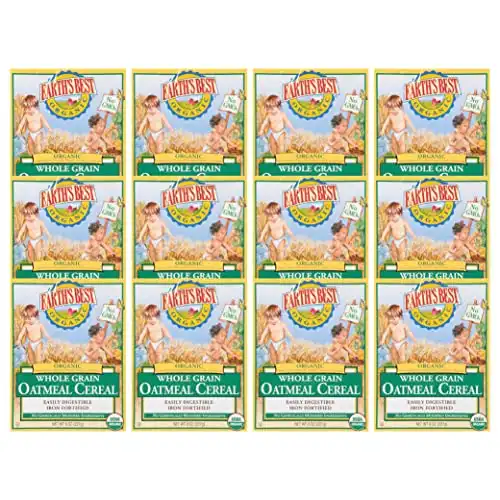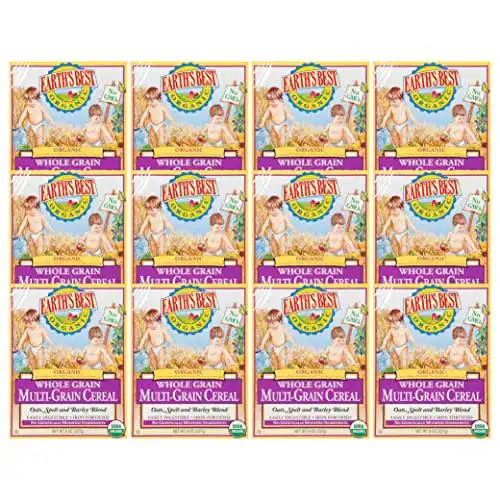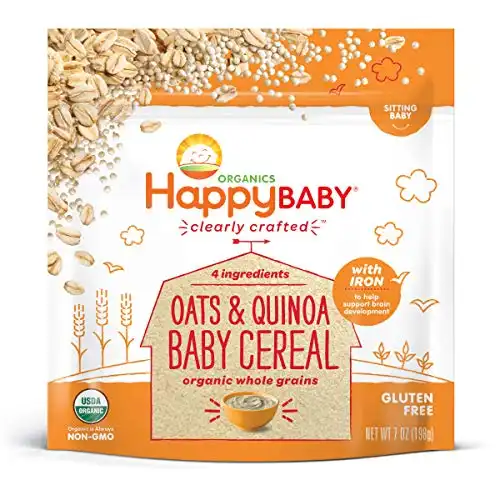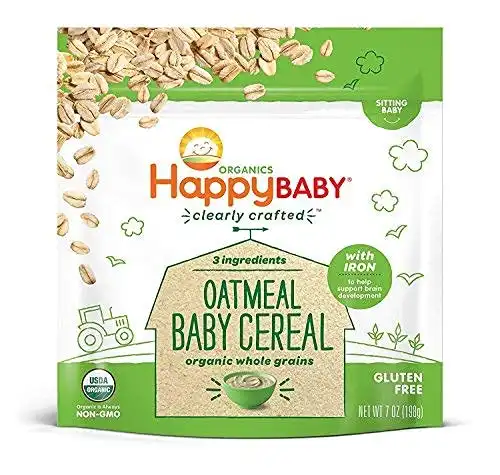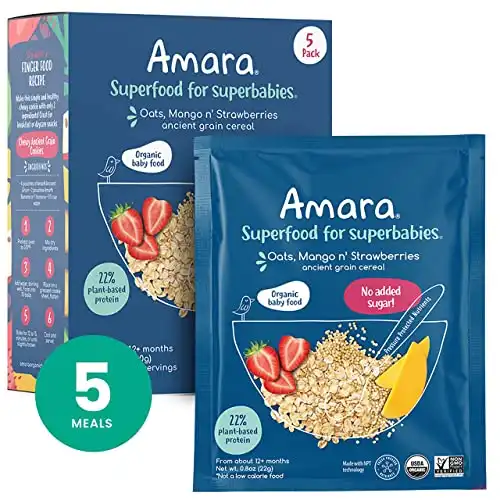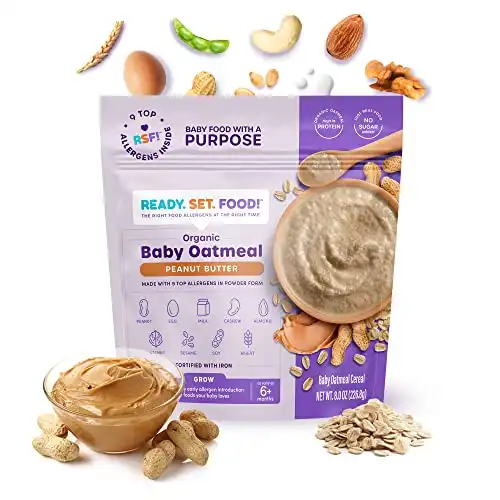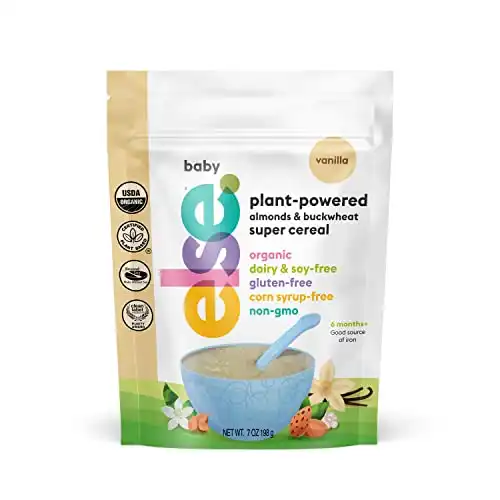Looking for the best organic baby cereal to introduce solid foods to your baby? Here are 7 top picks to get started with. Happy eating! Click here to skip directly to the list.
If your little one is finally ready to start solid foods, cereal is a great transitional food that you can introduce them to. But how do you know what kind of cereal to feed them?
Well, you obviously want something that is nutritious, easy to prepare, and tasty for your little one.
The problem is, there are so many cereal options out there to choose from. But with so many cereal options out there, how do you choose the best organic baby cereal for your baby to have the best start?
Because the amount of food babies eat is actually very small, you want to be offering them new foods that are packed with nutritional value for their growing bodies. Fortunately, most cereal recipes are fortified with alpha amylase, which is a naturally occurring compound which helps us and babies absorb nutrients.
I also think it’s important to choose organic food options for your baby to avoid exposure to potentially harmful pesticides or heavy metals. Well, if that’s the question on your mind, I’ve got you covered with these different brands.

All the brands included here are made using natural ingredients and are fortified with iron and other essential nutrients. They are also free of GMOs and artificial additives that many organically-minded mamas like myself tend to avoid. The American Academy of Pediatrics suggests feeding babies a variety of grains to limit high levels of arsenic and heavy metals exposure.
It’s a priority for me to choose organic and safe products and organic foods for my own kids. I pick organic when I can with everything from vitamins to their pillows, sheets, and blankets to their clothes and pajamas.
So whether you’re looking for a single-grain cereal, a multi-grain blend, or a fruit and grain puree, you’ll find it all here. This blog post is all about the best organic baby cereal for babies. Let’s dive into the best baby cereals so you can find the right baby cereal for your baby!
This post may contain affiliate links.
The Top 7 Best Organic Baby Cereals
Earth’s Best Organic Whole Grain Baby Oatmeal Cereal
Made with a simple blend of ingredients, like organic whole grain oat flour, for a gentle cereal that helps support your little one's growth.
If you are looking for a simple and wholesome cereal for your baby, you might want to try this one from Earth’s Best. It is made with organic whole grain oat flour that is free of pesticides and GMOs.
It is also packed with good iron content to help your baby’s development. You can easily prepare it by mixing it with breast milk, infant formula, or water. Earth’s Best Organic Whole Grain Baby Oatmeal Cereal has a smooth texture and a natural oat flavor that your kiddo will enjoy!
Pros:
- Made with organic oats
- Iron-fortified baby cereal
- No artificial ingredients
- Smooth texture and natural flavor
Cons:
- May not be gluten-free
Earth’s Best Organic Multi-Grain Infant Cereal
This baby cereal is made of barley, oats, and spelt which introduces your baby to new flavors and textures.
Earth’s Best Organic Multi-Grain Infant Cereal is a great first food to introduce your baby to a variety of grains and flavors.
This cereal is made with a blend of organic oats, barley, and spelt. It also has electrolytic iron to support your baby’s growth and development. Plus, it does not have any artificial ingredients that could harm your baby’s health. This cereal has a variety of textures and flavors that your baby will love.
Pros:
- Made with a blend of organic whole grains
- Fortified with iron
- No artificial ingredients
- Variety of textures and flavors for your baby to explore
Cons:
- Not gluten-free
Happy Baby Organics Clearly Crafted Oats & Quinoa Baby Cereal
This organic baby cereal introduces your baby to a new grain - quinoa!
This hearty cereal from Happy Baby Organics is a unique and nutritious option for your baby. It is a simple blend of ingredients made with organic oats and quinoa, two super whole grains that are rich in protein, fiber, and antioxidants.
This made the best cereal list because it is also fortified with iron and contributes to a daily value of iron to support your baby’s growth and development. It is super easy to prepare; all you have to do is mix it with breast milk, infant formula, or water.
You can then adjust the thickness following the usage instructions according to your baby’s liking. Your baby will love its nutty flavor and hearty texture!
Pros:
- Made with organic oats and quinoa
- Fortified with iron and Vitamin C
- No artificial ingredients
- Comes with a nutty flavor and hearty texture
Cons:
- May be too thick for some babies
- Plastic packaging may not be eco-friendly
Happy Baby Organics Clearly Crafted Oatmeal Baby Cereal
This organic cereal from Happy Baby offers a fortified way to introduce your baby to solid textures.
Happy Baby Organics Clearly Crafted Oatmeal Baby Cereal is a simple and satisfying choice for your little one.
It is made with organic oats that are high in fiber, vitamins (like b vitamins, vitamin e, and vitamins c), and minerals. This organic oatmeal also has iron to help your baby’s growth and development.
You’ll love that it comes with no artificial ingredients that could harm your baby’s health. This cereal has a natural oat flavor and a smooth texture that your baby will like.
Pros:
- Made with organic oats
- Fortified with iron
- No artificial ingredients
- Natural oat flavor and smooth and easy to digest texture
Cons:
- May be too bland for some babies palettes
Amara Organic Baby Food Ancient Grain Cereal with Fruit Bites
This certified organic baby cereal offers the addition of mango and strawberries for a little more flavor for your little eater.
This gentle cereal from Amara Organic Baby Food is a fun and flavorful option for your baby.
It is made with organic ancient grains, such as millet, buckwheat, and amaranth, that are packed with protein, fiber, and antioxidants.
It also has organic fruit bites, such as banana, strawberries, and mango, that add natural sweetness and vitamins. Your little one will go nuts over this cereal’s fruity flavor and crunchy texture!
I think this one personally is for slightly more advanced eaters – after your baby has been having solid foods for several weeks or months. It also can make great toddler snacks.
Pros:
- Made with organic ancient grains and fruit bites
- No artificial ingredients
- Fruity flavor and crunchy texture
- Easy to prepare
Cons:
- May be too sweet for some babies
- May contain allergens such as strawberries
Ready, Set, Food! Organic Baby Oatmeal Cereal
This organic cereal allows you to introduce a top allergen, peanuts, in an easy and approachable way.
Ready, Set, Food! Organic Baby Oatmeal Cereal is one of our top picks for this list.
This brand of baby cereal is more than just a good option for infant cereal; it is also a system that is designed to help your baby prevent food allergies. It is made with organic oats that are high in fiber, vitamins, and minerals.
It also has organic peanut, egg, and milk powders that will introduce your baby to these common allergens in a safe and gradual way.
In this way, your baby gets to enjoy benefits far beyond a full tummy at every feeding session!
Pros:
- Made with organic oats and allergen powders
- No artificial ingredients
- Mild taste and smooth texture
- Helps prevent food allergies
Cons:
- May not be suitable for babies with existing allergies
Else Nutrition Super Cereal For Babies
This certified organic cereal from Else offers vanilla-flavored, plant-powered nutrition for your baby.
This cereal from Else Nutrition is a superfood for your baby. It is made with organic almonds, buckwheat, and tapioca that provide your baby with plant-based protein, healthy fats, and complex carbohydrates.
It also has 20 vitamins and minerals that support your baby’s growth and development. That’s why it’s made it to the top of our list. Your little one will love its nutty flavor and creamy texture!
Pros:
- Made with organic almonds, buckwheat, and tapioca
- No artificial ingredients
- Nutty flavor and creamy texture
- Provides plant-based protein and healthy fats
- USDA organic
Cons:
- May contain allergens such as almonds
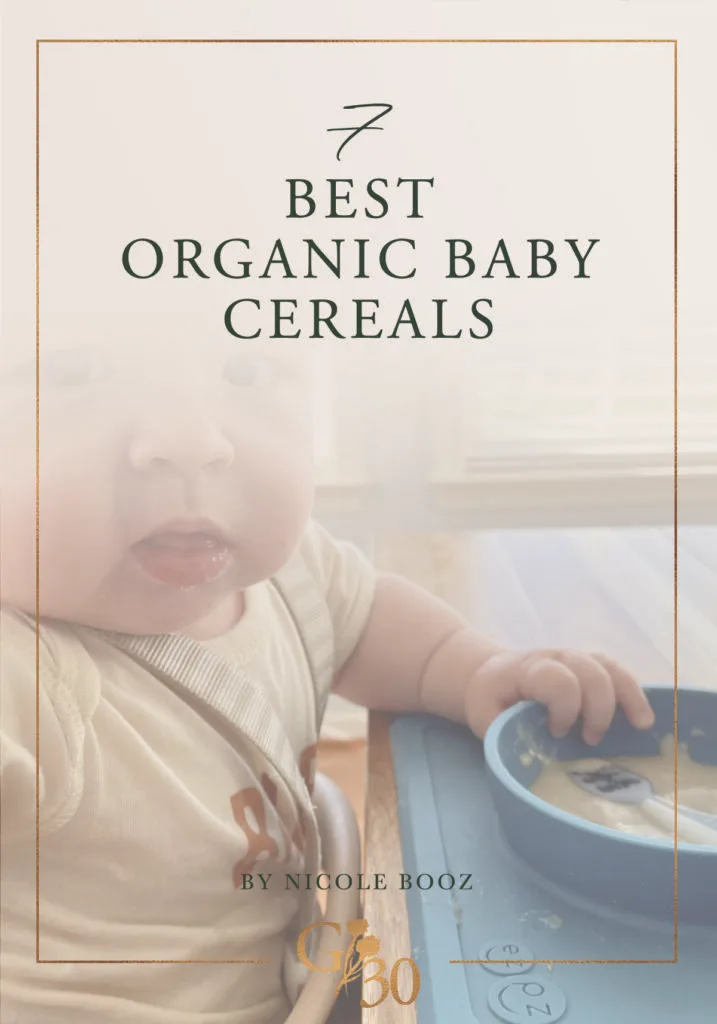
Final Thoughts on the Best Organic Baby Cereal
It is true that choosing the best organic baby cereal for your little one can be a tough new window to open. However, we hope that our list of the top 7 best organic baby cereals this year has helped you narrow down your choices a bit among the wide variety of infant cereal.
All the options here are made with high-quality organic ingredients that are gentle on your baby’s digestive system and provide essential nutrients for their growth and development.
Plus, they are delicious and easy to prepare! Remember, the best organic baby cereal is the one that your baby loves and thrives on! Good luck!
GenThirty’s Non-Toxic Guides:
- Non-Toxic Baby Pool Options For Kids
- 11 Best Natural Baby Laundry Detergent Picks
- 15 Best Organic Baby Blanket Picks
- Best Organic Nursing Pillow (5 Top Picks)
- 6 Best Organic Cotton Crib Sheets
- 10 Best Organic Baby Pajamas – Mom Approved
- 6 Best Organic Toddler Pillow Options
- Non Toxic Sand For Sandbox: 3 Picks
- 8 Non-Toxic Couches For a Healthy Living Room
- 7 Best Organic Pillow Picks
- 4 Best Baby-Safe, Non-Toxic Paints For Your Nursery
- Top 7 Best Organic Baby Cereal Picks

